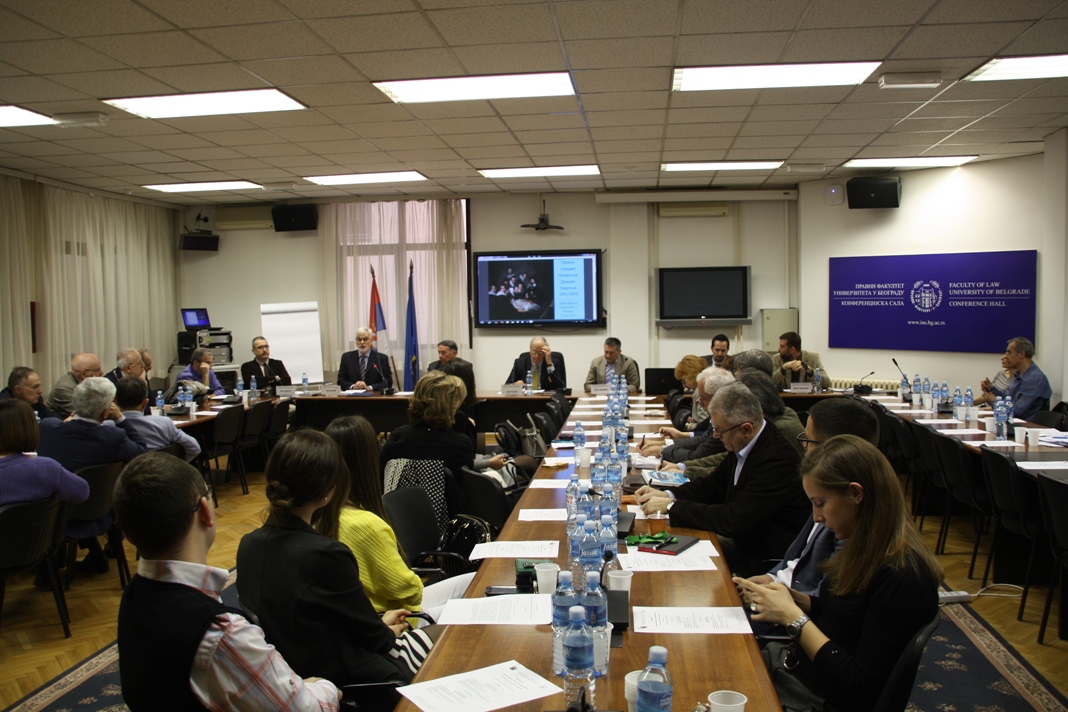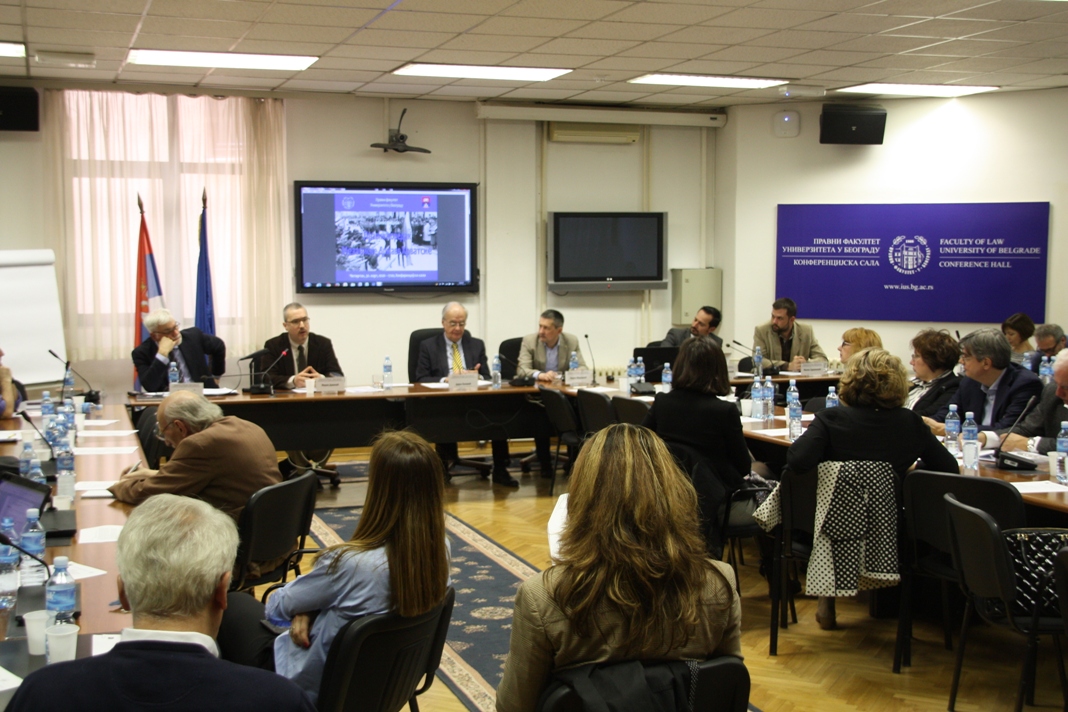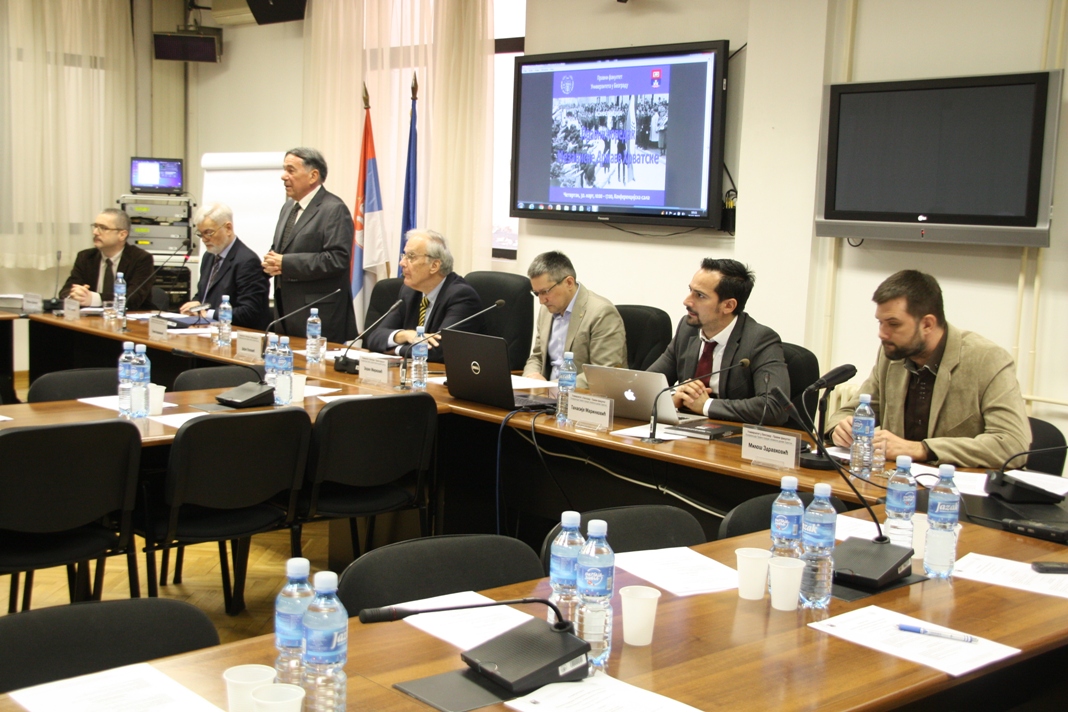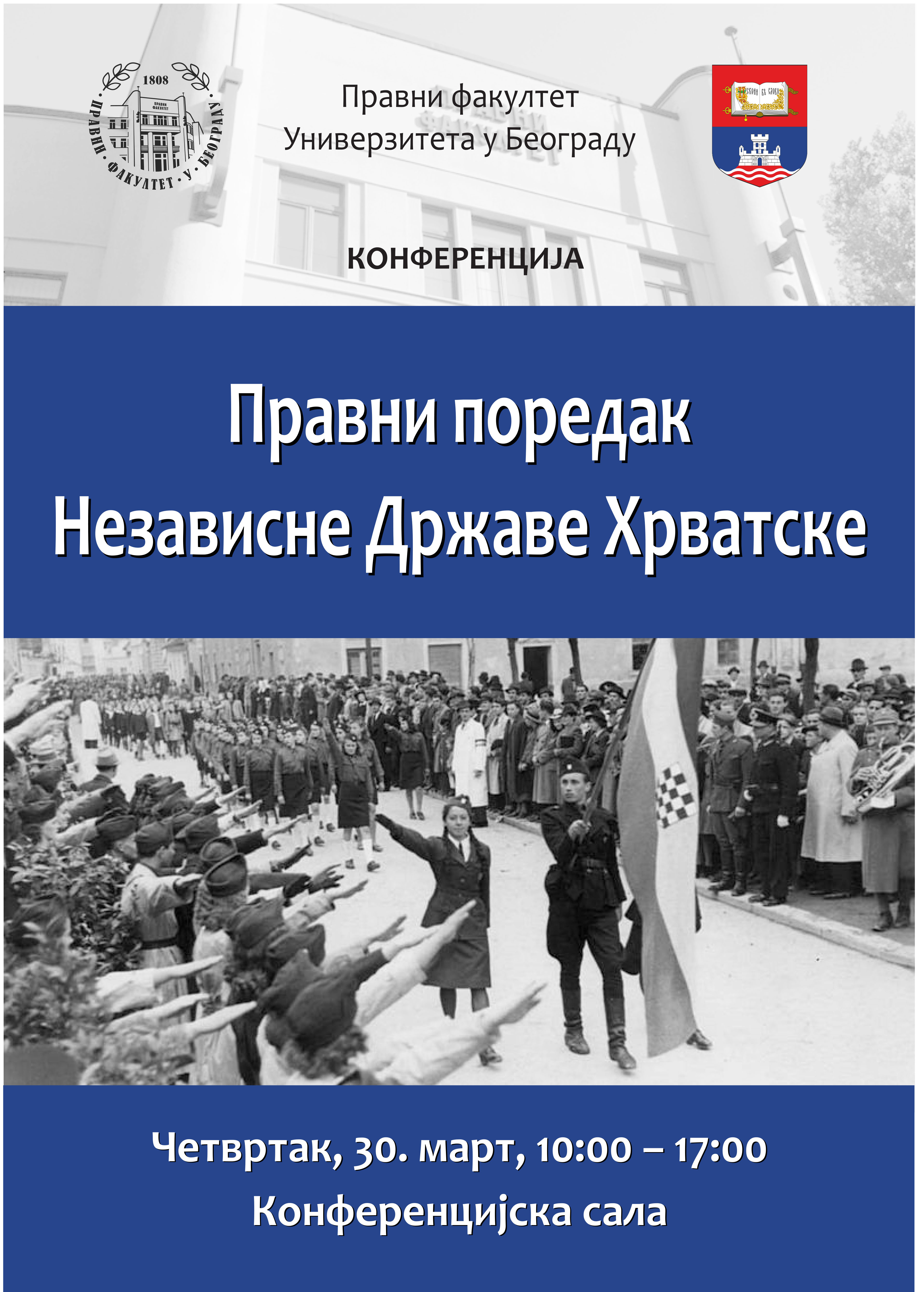The Legal Order of the Independent State of Croatia Conference was held on Thursday, 30 March, 2017, at the University of Belgrade Faculty of Law, where lecturers of this faculty presented their papers on the topic of the elements of the legal system of the Independent State of Croatia (NDH)
In the first portion of the conference, which was opened by the Dean of the University of Belgrade Faculty of Law, Prof. Sima Avramović, with an introduction by Prof. Boris Begović, the presentations focused on issues of legality of the NDH system (Senior Lecturer Miloš Zdravković), racial legislation (Prof. Zoran Mirković), organization of authority (Prof. Tanasije Marinković), and legal organization of the military and police forces in the NDH (Prof. Marko Davinić).
In the continuation of the conference, the presentations focused on criminal law in the NDH (Prof. Igor Vuković, PhD), its international legal status (Prof. Ivana Krstić and Senior Lecturer Miloš Jovanović), tax law in the NDH (Prof. Dejan Popović), the legal position of the Croatian Orthodox Church (Senior Lecturer Dalibor Đukić), and property law in the NDH (Senior Lecturer Nina Kršljanin). The arguments given in the presentations and during the very lively discussion that followed confirmed, to a great degree, the basic hypothesis that the Independent State of Croatia was in fact a state.
Participants in the conference also included President of the Serbian Academy of Sciences and Arts (SANU) Vladimir Kostić, SANU members Danilo Basta and Ljubodrag Dimić, leading local historians, as well as a large number of lecturers and associates from the University of Belgrade Faculty of Law. All the papers from this conference will be presented on Belgrade Radio Programme 3, and the proceedings will be published later during the year.
CONFERENCE
LEGAL ORDER OF THE INDEPENDENT STATE OF CROATIA
University of Belgrade Faculty of Law, 30 March, 2017
Paper summaries:
Miloš Zdravković
THE“LEGALITY” OF THE NDH ORDER
The answer to the legality of the Independent State of Croatia (NDH) system is sought within the general theory of law, it being the discipline that should provide basic knowledge on common and significant characteristics that a system should have in order to be considered legal. Regardless of the differences between various theoretical concepts, all of them imply that a legal system is normative, i.e. that it consists of norms. In addition to normativity, a condition for a legal system to exist is generally efficiency, i.e. a requirement is for the rules to be obeyed in general and that they are effective in a general sense.
The normativity of the law is not expressed solely through it contains norms; it also implies that the law gives people a specific reason to act and choose, because legal norms represent instructions for practical human social activities. The essential issue regarding the normativity of the NDH system lies in the fact that to many people it did not provide any rational reasons, based on which they could direct their behaviour. On the other hand, the NDH system was not efficient to a high degree, because regulations of the NDH legislation, and its implementation by the Ustashi authorities especially did not provide for survival of a large number of people; in fact, it completely put their existence in jeopardy, therefore the people it was directed at did not have a reason to respect it.
The conducted legal and theoretical analysis of the issues of legality of the NDH system shows the only definite answer that can be given to those questions is that the NDH system was not a legal system in the traditional sense of the word, and therefore its legality should be brought into question.
Zoran S. Mirković
RACIAL LEGISLATION IN THE NDH (1941-1945)
Nazi Germany created setting for large scale violence, but other participants in the shadow of the Nazi might had their own interests and reasons to destroy the undesirables. Croatia’s example illustrates that racial laws and the subsequent persecution of Jews and Roma followed as the conscious and independent action of the Independent State of Croatia (NDH), aimed at achieving its own goals. The persecution of Jews, who were accused of being an extension of the Serbian regime, was based on the desire to eliminate their economic and social influence. On the other hand, the Roma were considered socially undesirable “parasites”, who should be removed accordingly. The Independent State of Croatia with, all the instruments of state power, from legal provisions to ministerial orders, and the engaging of all available military and police forces, instead of the protection pledged in Article 1 of the Law on Nationality, to take away the rights, property, freedom, and ultimately the lives of people belonging to these two groups.
Tanasije Marinković
ORGANIZATION OF AUTHORITY IN THE NDH
The political authority in the Independent State of Croatia (NDH) was based on a national-socialist and fascist idea of the state and state law, i.e. the state being a legal organization of one nation, and the nation being an organic entity held together by the unity of pre-political, tribal bonds. The constitution and subjective rights of the “citizens” are not a category in themselves, but only means through which the state expresses and achieves its will. Fascism focuses on the state’s legal organization, while national-socialism focuses on on its national contents.
In addition to being modelled on the ideas and practice of state law, the NDH took over the paradigm of a totalitarian political system from Mussolini’s Italy and Hitler’s Germany. One of its features, inter alia, was the existence of an official ideology, i.e. a teaching on all important aspects of individual and common life. This ideology was developed and implemented, often through the use of force and terror, by a suitable para-state organization (initially the political party), led by a sacrosanct leader.
This paper discusses the elements of the doctrine of state law and the totalitarian political system in the NDH organization of authority. First it analyses the instability of the legal organization of the NDH, reflected in the fact that there was no constitution in its formal sense, as well as in the “flood” of Pavelić’s laws. Then we present the horizontal and vertical organization of the NDH, based on the principle of unity of authority and strict centralization of state, benefiting the Leader (Poglavnik). Finally, we point out the ideology and organization of the Ustasha movement in the NDH, as an element of state authority, considering its role defined by the law “ensure that the Croatian state is always and everywhere ruled only by the Croatian people, and that they are the complete masters of all material and spiritual property in their country.”
Marko Davinić
LEGAL STRUCTURE AND ACTIVITIES OF MILITARY AND POLICE FORCES OF THE NDH
Immediately following the proclamation of the Independent State of Croatia (NDH), its military and police forces were formed, based on a number of regulations. The Home Guard units were the regular army, which was based on Austro-Hungarian military tradition. On the other hand, the Ustasha troops involved the military wing of the Ustasha movement and developed from a relatively small core of emigrants who returned to the country after the fall of the Kingdom of Yugoslavia. Bordering between the military and police forces was the Gendarmerie, which was defined in regulations as a guard with a military organisation. Besides them, the NDH armed forces also included legionary units, who were engaged as part of the German and Italian military, mostly on the Eastern Front.
The police intelligence apparatus of the new state developed in parallel with the military organization. Its main pillars were the Directorate for Public Order and Security, part of the Ministry of Interior, and the Ustasha Oversight Service, as the police intelligence wing of the Ustasha movement. This paper concludes that the fundamental problem during the entire existence of the NDH was the existence of parallel structures, which was obvious in both the military and the police forces. This situation stemmed from the desire of Ustasha movement representatives to gain control of not only the military and police forces, but also over all other spheres of life in the NDH. Furthermore, advancement in the Ustasha movement depended less on skills and competence, and more from informal positions, i.e. close ties with the Poglavnik and the people he trusted the most. Finally, the monstrous crimes committed by different units within the Ustasha movement greatly contributed to the strengthening of the Partisan and Chetnik units in the territory of the NDH, and to its ultimate downfall in May 1945.
Igor Vuković
A SYSTEM OF CRIME: CRIMINAL LAW IN THE NDH
The system of norms in criminal law adopted during the Independent State of Croatia (NDH) was completely served the purpose of creating and maintaining the atmosphere of terror, carried out by the Ustasha authority. Although the framework of the rules of evidence and procedure of the Kingdom of Yugoslavia formally remained in effect, immediately after the NDH was established, new regulations were adopted, which introduced numerous new crimes punishable by death. By defining the „honour and vital interests of the Croatian people” as a suitable object of protection under criminal law, allowed for the creation of a regime of legalised repression against the non-Croatian population, with extensively placed extraordinary criminal justice competence. In addition to abusing the mechanism of courts marshal, the criminal character of the authority also featured widespread implementation of the https://jadovno.com/wp-content/uploads/2010/02/13-1.jpgistrative and penal measures of sending people to concentration camps and collective punishment. Citing Gustav Radbruch, the author dismisses the legal character of the system of formally criminal regulations established in the NDH, under genocide circumstances.
Ivana Krstić and Miloš Jovanović
THE INTERNATIONAL LEGAL STATUS OF THE NDH
Whether the Independent State of Croatia (NDH) was a state from the aspect of international law or not carries certain political and legal consequences. If it can be considered a state, then the activities taken during its existence entail a much higher level of accountability. On the other hand, if it is shown that the NDH was just an instrument of the Axis occupation, then the main accountability for those actions rests with the occupier. For a long time there were two opposing opinions on this issue. Its international legal status had been contended mostly by the communist authorities in the post-war Yugoslavia, calling it the “so-called” NDH.
On the other hand, Croatian intellectuals mainly pointed out that the NDH had its own legal subjectivity and it was created under the circumstances of war, but as a result of the centuries-long struggle of the Croatian people. In order to answer this question, the authors, investigated the international legal status of the NDH from the standpoint of international legal activities, i.e. activities of diplomatic missions, documents on international recognition, signing of international treaties, and membership in international organizations. The paper concludes that the archival materials show that the NDH had enough independence in conducting its affairs, with the constant desire to preserve and increase that independence, and that it can be considered a factual state from the standpoint of international law. However, the authors also investigated whether independence recognition acts can be unlawful and this question is left open for discussion.
Dejan Popović
TAX LAW IN THE NDH
While researching the nature of tax law in the Independent State of Croatia (NDH), we did not use only normative analysis, since the need to also explore the circumstances in which it was created. Therefore the methodological approach was defined with two additional requirements: the first one, relying on Georges Gurvitch, could be called “law in action” (where law is not separated from its social reality), and the second is a comparative historical approach, based on parallel analysis of the circumstances in which Slovakian and Croatian law was created and functioned. Both Slovakia and the NDH were created through the destruction of states of which they had been integral parts, conducted through the power of German, i.e. German and Italian military force. In both cases a regime based on the Nazi regime was created, and both became involved in carrying out the Holocaust. Immediately after independence, the Slovakian regime started radical persecution of the Czechs, while in the NDH there was a mechanism of genocide against the Serbs. The difference in the treatment can be explained by the much smaller percentage of the Czech population in Slovakia compared to the Serbian population in the NDH, but also by the fact that both Slovaks and Czechs were predominately Catholics, while the Serbs were considered schismatics by the Catholic Church in Croatia.
A common feature of NDH and Slovakian law was the readiness to adopt legislation from the predecessor states, from whose destruction they had been created, in areas where these laws were not foundations of the „new order“. Therefore, in the area of tax law, Slovakia took over Czechoslovakian laws, while raising taxes and introducing war taxes as the war expenses increased. On the other hand, the NDH adopted the tax legislature of the Kingdom of Yugoslavia.
The framework of the tax system was the 1928 Law on Direct Taxation, which had all the characteristics of a schedular income tax model. The tax rates were increased through numerous addenda and amendments, in an attempt to decrease the budget deficit, however, the tax capacity was decreasing as the resistance against the Ustasha regime increased. Not even the extraordinary war tax or attempts by the state to obtain loans, nor the confiscation of Jewish and Serbian property could overcome the gap between public revenue and public expenditure. In the area of indirect taxation, it preserved the Yugoslav regulations on expenditures and taxes, and in 1943 the Poglavnik issued the Legal Provision on Business Turnover Taxation, which only slightly modified the sales tax system that had existed in the Kingdom of Yugoslavia, which was based on combined implementation of the cumulative multiphase tax and on the tax based on “graded flat rate” for 882 tariff numbers.
Although the NDH mostly kept the tax laws of the Kingdom of Yugoslavia, these regulations gained entirely new meaning in the state established according to the National Socialism model. Administrative authorities and the courts were only ostensibly bound by the law, but the so-called “general principles” (Leitsätze), to which all institutions had to adhere, made it possible for all decisions to be reached in accordance with the will of the Poglavnik and the interest groups around him. Under the Ustasha system a judge could not rely on his free judgement, because the “general principles” defined the law as the “leader’s order”. Law therefore became a “technical instrument for achieving certain political goals”. However, this was not a feature only of Croatian law, but also of German law at the time.
Dalibor Đukić
LEGAL STATUS OF THE CROATIAN ORTHODOX CHURCH
Researching the influence of religion on the events in the Independent State of Croatia (NDH) mostly also covers a short review on the establishment and activities of the Croatian Orthodox Church (HPC). Unlike most of questions regarding the organization of the NDH, which mainly have historical and legal significance, the appearance of the HPC is an event that echoes today, and could in the future present a serious challenge for the Orthodox Christian community in Croatia. Since the attempts of recreating the HPC are represented as its restoration and continuation of its activities that were forcibly terminated under the communist regime, the author tries to establish what was characteristic of the creation called the HPC, what was its official legal status in the NDH legal system, what was its canonical and legal status within the Orthodox Church, and whether its organizational structure matched the canonical tradition of the Orthodox Church. In literature we can find analyses that analyse whether the NDH was actually a state, Croatian and independent. In this paper, the author analyses whether the HPC was actually a church, Croatian and Orthodox.
Nina Kršljanin
REAL ESTATE LEGAL REGIME IN THE NDH
Although at first glance it is less important for determining the character of the state and legal system of the NDH than public law, civil law also encompasses part of the general picture on this issue. The relationship of the state towards its citizens, in the very area where they should have the most freedom, can tell a lot about that state. The real estate legal regime was chosen for analysis due its explicit economic importance for both the state’s economy and to the individual. The NDH’s regulations in this area can be generally divided into three categories: the first are obviously unjust and discriminatory regulations, the second are neutrally formulated (often restrictive norms caused by wartime circumstances), while the third are those that at first glance seem to treat citizens equally, but contain implicit discrimination or rely on other such documents. This paper analyses the most important norms from all three categories, with examples of their implementation in practice. Based on their mutual relationship, i.e. the system which was built on the foundation of cruel discrimination in such mixed manner and under a veil of legality – the author gives an assessment on the nature of the system in the NDH.




